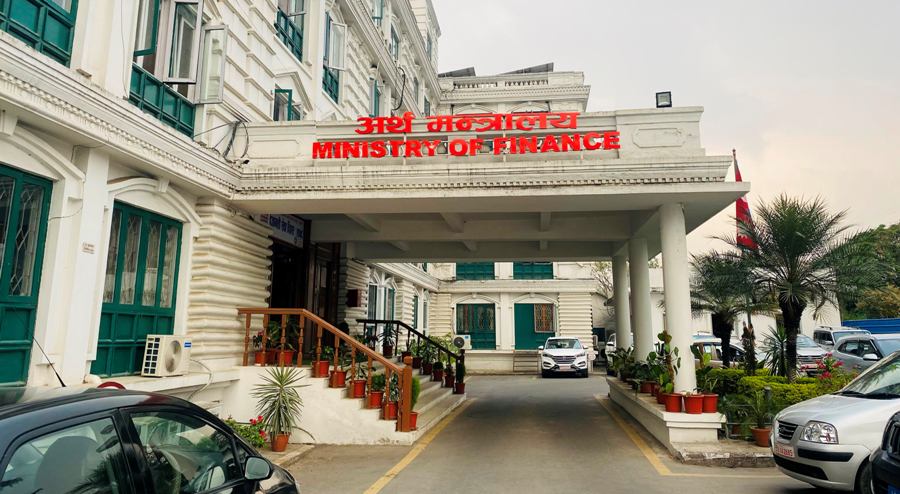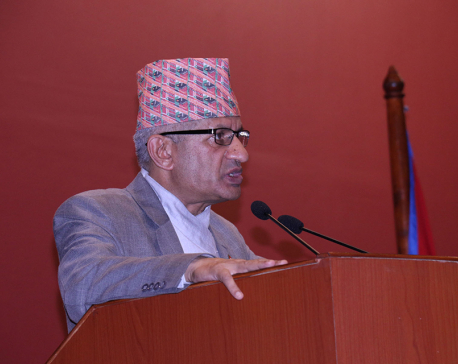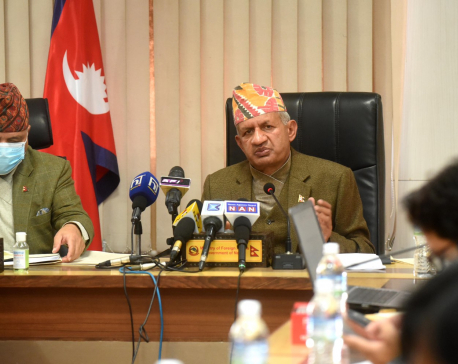
OR
Leveraging Foreign Policy for Economic Prosperity
Published On: May 12, 2024 08:05 AM NPT By: Shanker D Bairagi


Shanker D Bairagi
The author is the National Security Advisor to the Government of Nepalnews@myrepublica.com
More from Author
The foreign policy of any country is meant to serve its national interests through engagements and interactions with the larger world. The Constitution of Nepal stipulates that safeguarding the freedom, sovereignty, territorial integrity, nationality, independence and dignity of Nepal, along with the rights of the Nepali people, border security, economic wellbeing and prosperity shall be the basic elements of the national interests of Nepal.
Likewise, under the Policies of the State spelled out in the Constitution, it is mentioned that the country will conduct an independent foreign policy based on the Charter of the United Nations, non-alignment, Panchasheel, international law and the norms of world peace, taking into consideration the overall interest of the nation.
Thus, the Constitution, while underlining the primary national interest of safeguarding sovereignty, independence and territorial integrity of the nation as paramount,accords equal emphasis promoting the economic interest of the country. Successive governments have been guided by these overarching pronouncements in the exercise of foreign policy and pursuit of national interests accordingly.
In today’s world, economic interests have come to the forefront of foreign policy consideration. Economic strength is increasingly determining the country’s composite power and international stature. For every country, big or small, economic interests are, therefore, overriding many other considerations.
Diplomacy in contemporary practices has accordingly seen the economic goals occupying the centerstage.This does not mean that diplomacy has lost its traditional role of maintaining alliance, political engagements, and ideological connections. What has happened is the inclusion of various dimensions of economic functions in the domain of diplomacy – with increasingly high visibility.

Nepal also considers serving the country’s economic interests as the paramount objective of its foreign policy. Economic diplomacy is now a core function, focusing on trade and tourism, foreign direct investment (FDI) and technology transfer, development cooperation and mobilization of other resources, foreign employment and remittances as well as enhancing connectivity regionally and globally.
Nepal’s Foreign Policy 2077 BS envisages that the country’s foreign policy should seek to contribute to economic development and prosperity through effective conduct of economic diplomacy in sectors, including mobilization of development assistance and promotion of foreign investment, and promotion of export trade and tourism.The Policy document has specified a number of strategies that include expanding bilateral and multilateral economic relationships and engagements.
Needless to say, Nepal has abounding potential of economic growth and development, which is yet to be utilized. The country’s strategic location between two huge and rapidly growing economies can in itself be a boon if we are able to maintain and manage the relations with our neighbors properly. If we can generate sufficient financial resources and technology for harnessing our vast hydropower potential, there exists a huge possibility for us to be a source of clean energy not only for our economy but also for this region. Our young and dynamic population is an asset that requires quality education, proper training, an enabling environment for start-up, innovation and entrepreneurship.
However, for our economic diplomacy to succeed, the fundamentals at home must be transformed–be it the enhancement of our productive competitiveness or assurance of a more conducive environment for foreign investment or ensuring better infrastructure services, safety and security of tourists or streamlining our domestic trade logistics. After all, successful diplomacy is a combination of strength at home and active outreach abroad.
For example, on the trade front, as a least developed country, Nepal is offered duty-free-quota-free(DFQF) market access for its export products by most of the major economies.Yet, the utilization rate is far below the optimum – be it the case of the EU’s Everything But Arms (EBA) scheme or the USA’s Nepal Trade Preference Program(NTPP), under which 77 specific products from Nepal are granted DFQF treatment. This is largely because of deficiency in our productive capacity, which we need to address first.As the world market requires production in volumes, it is advisable for the country to focus on product-specific industrialization.
Our fundamentals need to be corrected on the investment front as well.
Neighborhood is our next-door market. With India, Nepal conducts 65 percent of its international trade while with China it is mere 14 percent. That means we do only one third of trading with the rest of the world. With neighbors and most other countries alike, Nepal faces a huge trade deficit and the overall export-import ratio currently stands at a staggering 1:13.
Given the obvious importance of trade relations with the neighboring countriesand the level of our trade deficit, we need to pursue the measures that would help enhance our export to both markets.
With India, we need to seek favorable treatment to protect our agriculture sector, as our agriculture products cannot compete with imports from India.
With China, our focus should be on acquiring preferential market access for specific products of our export interest and on simplification of procedures.
With the USA, we should pursue the continuity and expansion of product coverage of the NTPP. Even one or two products of high possibility such as an item or two of apparel and footwear could be a game changer in the expansion of Nepal’s manufacturing sector.
With the EU, the UK, Germany and, for that matter, other preference providing trade partners like Japan, Canada and Australia, we need to conduct rigorous homework and serious negotiations on the kind of preferential arrangements following Nepal’s graduation from the Least Developed Country status in 2026.
In addition, eliminating the technical barriers to export through the harmonization of standards, mutual accreditation of test labs, and mutual recognition of test certificates is essential to ensure that market access for our products is predictable and hassle-free.
Amidst a highly competitive environment around the world, foreign investment does not come without assurance of profitability, security and protection.It also appears that international investors will not come in the absence of a secure legal regime governed by agreements. In sucha situation, the importance of concluding some form of bilateral investment protection instrument cannot be overemphasized.
It's a positive development that the Government of Nepal has recently approved the template of the Bilateral Investment Agreement (BIA). The upcoming Third Nepal Investment Summit is expected to take note of this positive step. With assured legal protection, it should help encourage a greater flow of investment not only from our neighbors but also from other developed countries and the booming economies of East Asia and the Middle East.
Another positive development in the context of the Investment Summit is the government’s commitment to amend a number of relevant law sand rules before the Summit so as to create an investment-friendly legal environment in the country.
It is not only the legal and policy reforms that matter;the streamlining of procedures and cost-cutting and time-saving measures are equally important to encourage foreign investment. On the whole, we should look at the various parameters of the ease of doing business and improve them in order to be a competitive and attractive investment destination.
There are certain sectors wherein we have started to see enormous promises and strong competitive advantage when it comes to investment. The long-term power trade agreement with India and the ongoing conversation on materializing power trade with Bangladesh provide to some extent the assurance of market for the surplus clean energy generated from the hydropower projects in Nepal, thereby incentivizing investment.
Given the strength of centuries-old socio-cultural and civilizational connections Nepal shares with its neighboring countries, which collectively comprise nearly 3 billion people with rising income levels, tourism, including cultural tourism, holds significant potential. We can strive to attract more investment in tourism infrastructure and the development of high-quality tourism services targeting both neighboring and other countries.
Information and Communication Technology (ICT) is also emerging as one of the fastest growing sectors in Nepal with the promises of quality, high-paying jobs for tech-savvy Nepali youths. With uninterrupted supply of clean energy, a pool of well-trained, talented young workforce, and comparatively lower development cost, Nepal can promote itself as a suitable offshore outsourcing location for big foreign IT companies.
For a landlocked country like Nepal, transit, connectivity as well as associated infrastructures, and hardware and software of trade facilitation are essential to minimize the trade cost. Historically an entry point to vast territories on both sides of the Himalayas, Nepal wants to take advantage of the rapid pace and scale of economic transformation taking place in its neighborhood. This can only be possible if we are better connected by the network of the state-of-the-art multimodal infrastructure.Nepal should focus on the early completion of the identified connectivity projects.
While working under the frameworks of regional and sub-regional cooperation such as SAARC, BIMSTEC and BBIN, Nepal’s top priority should be to promote connectivity and linkages.
Development finance is equally important for Nepal and more so to realize the Sustainable Development Goals and our ambition to become a middle-income country by 2030. While the emerging trend indicates a decline in financing under traditional development cooperation, we may have to explore other sources of financing such as concessional loans and blended finance to generate resources for big, economically viable infrastructure projects. We should also explore avenues of new development funds and infrastructure banks where needed.
We also need to strengthen our engagements with the countries in the Gulf Cooperation Council, going beyond the existing domain of foreign employment. Given the level of their economic prosperity and availability of funds at their disposal, these countries could be new sources of investment and development financing.
Successful economic diplomacy requires a strong institutional back up. We must strengthen the foreign ministry and Nepali missions abroad in termsof financial and human resources so as to furnish them with competent and professional manpower. The existing institutional mechanism for economic diplomacy needs to be revamped and made capable of performing coordination functions of economic diplomacy in an effective manner as well as evaluating the works of the missions in this sphere.
We must introduce and rigorously implement the practice of performance evaluation of our missions and the ambassadors against various indicators of accomplishments on economic diplomacy.
With the shifting power balance, the world is facing the rise of geopolitical contests. Under these circumstances, small and less resourceful countries are finding it increasingly difficult to navigate their foreign policies. Constraints and conditions under which countries operate are getting trickier. Their choices are becoming tougher. The conventional notion that economic interactions can remain immune from political ups and downs does not hold any more, as there are signs of growing politicization of economic tools.
As Nepal is not a military or economic power, pragmatic diplomacy with clear-cut focus on serving the country’s interests remains the only available tool at our disposal. We should seek cooperation from friendly countries in our priority areas and under the terms and conditions that suit our context. Without compromising our vital national interests, we need to pursue more vigorously the agenda of economic transformation with a pragmatic mindset.The whole-of-the-country approach should apply to foreign as well as other vital policy areas. After all, making the nation stronger and economically prosperous is everyone’s responsibility.
You May Like This

Economic diplomacy has been prioritized: Minister Gyawali
KATHMANDU, July 8: Minister for Foreign Affairs Pradeep Kumar Gyawali has said the nation's foreign policy hinged on the cooperation... Read More...

Evaluating Nepal’s new foreign policy
To practically implement the new foreign policy, it is important to integrate it with core national interests and priorities. ... Read More...

Bungling on diplomacy
Our politicians rarely care about diplomatic protocol. They are always ready to meet any foreign guests and speak about foreign policy... Read More...










Just In
- NRB introduces cautiously flexible measures to address ongoing slowdown in various economic sectors
- Forced Covid-19 cremations: is it too late for redemption?
- NRB to provide collateral-free loans to foreign employment seekers
- NEB to publish Grade 12 results next week
- Body handover begins; Relatives remain dissatisfied with insurance, compensation amount
- NC defers its plan to join Koshi govt
- NRB to review microfinance loan interest rate
- 134 dead in floods and landslides since onset of monsoon this year








Leave A Comment